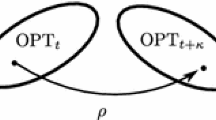Abstract
Dynamic optimization is frequently cited as a prime application area for evolutionary algorithms. In contrast to static optimization, the objective in dynamic optimization is to continuously adapt the solution to a changing environment– a task that evolutionary algorithms are believed to be good at. At the time being, however, almost all knowledge with regard to the performance of evolutionary algorithms in dynamic environments is of an empirical nature. In this paper, tools devised originally for the analysis in static environments are applied to study the performance of a popular type of recombinative evolution strategy with cumulative mutation strength adaptation on a dynamic problem. With relatively little effort, scaling laws that quite accurately describe the behavior of the strategy and that greatly contribute to its understanding are derived and their implications are discussed.
Access this chapter
Tax calculation will be finalised at checkout
Purchases are for personal use only
Preview
Unable to display preview. Download preview PDF.
Similar content being viewed by others
References
P. J. Angeline. Tracking extrema in dynamic environments. In Proc. of the Sixth International Conference on Evolutionary Programming, pages 335–345. Springer Verlag, Heidelberg, 1997.
D. V. Arnold and H.-G. Beyer. Local performance of the (μ/μI, λ)-ES in a noisy environment. In W. N. Martin and W. M. Spears, editors, Foundations of Genetic Algorithms 6, pages 127–141. Morgan-Kaufmann, San Francisco, 2000.
D. V. Arnold and H.-G. Beyer. An analysis of cumulative mutation stength adaptation. In preparation, 2002.
T. Bäck. On the behavior of evolutionary algorithms in dynamic environments. In Proc. of the 1998 International Conference on Evolutionary Computation, pages 446–451. IEEE Press, Piscataway, NJ, 1998.
H.-G. Beyer. Toward a theory of evolution strategies: Some asymptotical results from the (1 +, λ)-theory. Evolutionary Computation, 1(2):165–188, 1993.
H.-G. Beyer. The Theory of Evolution Strategies. Natural Computing Series. Springer Verlag, Heidelberg, 2001.
J. Branke. Evolutionary Optimization in Dynamic Environments. Kluwer Academic Publishers, Dordrecht, 2001.
R. Bürger. The Mathematical Theory of Selection, Recombination, and Mutation. John Wiley & Sons, Chichester, 2000.
S. Droste. Analysis of the (1 + 1) EA for a dynamically changing objective function. In Proc. of the 2002 Congress on Evolutionary Computation. IEEE Press, Piscataway, NJ, 2002.
N. Hansen and A. Ostermeier. Completely derandomized self-adaptation in evolution strategies. Evolutionary Computation, 9(2):159–195, 2001.
N. Hansen. Verallgemeinerte individuelle Schrittweitenregelung in der Evolutionsstrategie. Mensch & Buch Verlag, Berlin, 1998.
I. Rechenberg. Evolutionsstrategie’ 94. Frommann-Holzboog, Stuttgart, 1994.
R. Salomon and P. Eggenberger. Adaptation on the evolutionary time scale: A working hypothesis and basic experiments. In Proc. of the Third Conference on Artificial Evolution, pages 251–262. Springer Verlag, Heidelberg, 1997.
K. Weicker and N. Weicker. On evolution strategy optimization in dynamic environments. In Proc. of the 1999 Congress on Evolutionary Computation, pages 2039–2046. IEEE Press, Piscataway, NJ, 1999.
Author information
Authors and Affiliations
Editor information
Editors and Affiliations
Rights and permissions
Copyright information
© 2002 Springer-Verlag Berlin Heidelberg
About this paper
Cite this paper
Arnold, D.V., Beyer, HG. (2002). Random Dynamics Optimum Tracking with Evolution Strategies. In: Guervós, J.J.M., Adamidis, P., Beyer, HG., Schwefel, HP., Fernández-Villacañas, JL. (eds) Parallel Problem Solving from Nature — PPSN VII. PPSN 2002. Lecture Notes in Computer Science, vol 2439. Springer, Berlin, Heidelberg. https://doi.org/10.1007/3-540-45712-7_1
Download citation
DOI: https://doi.org/10.1007/3-540-45712-7_1
Published:
Publisher Name: Springer, Berlin, Heidelberg
Print ISBN: 978-3-540-44139-7
Online ISBN: 978-3-540-45712-1
eBook Packages: Springer Book Archive




